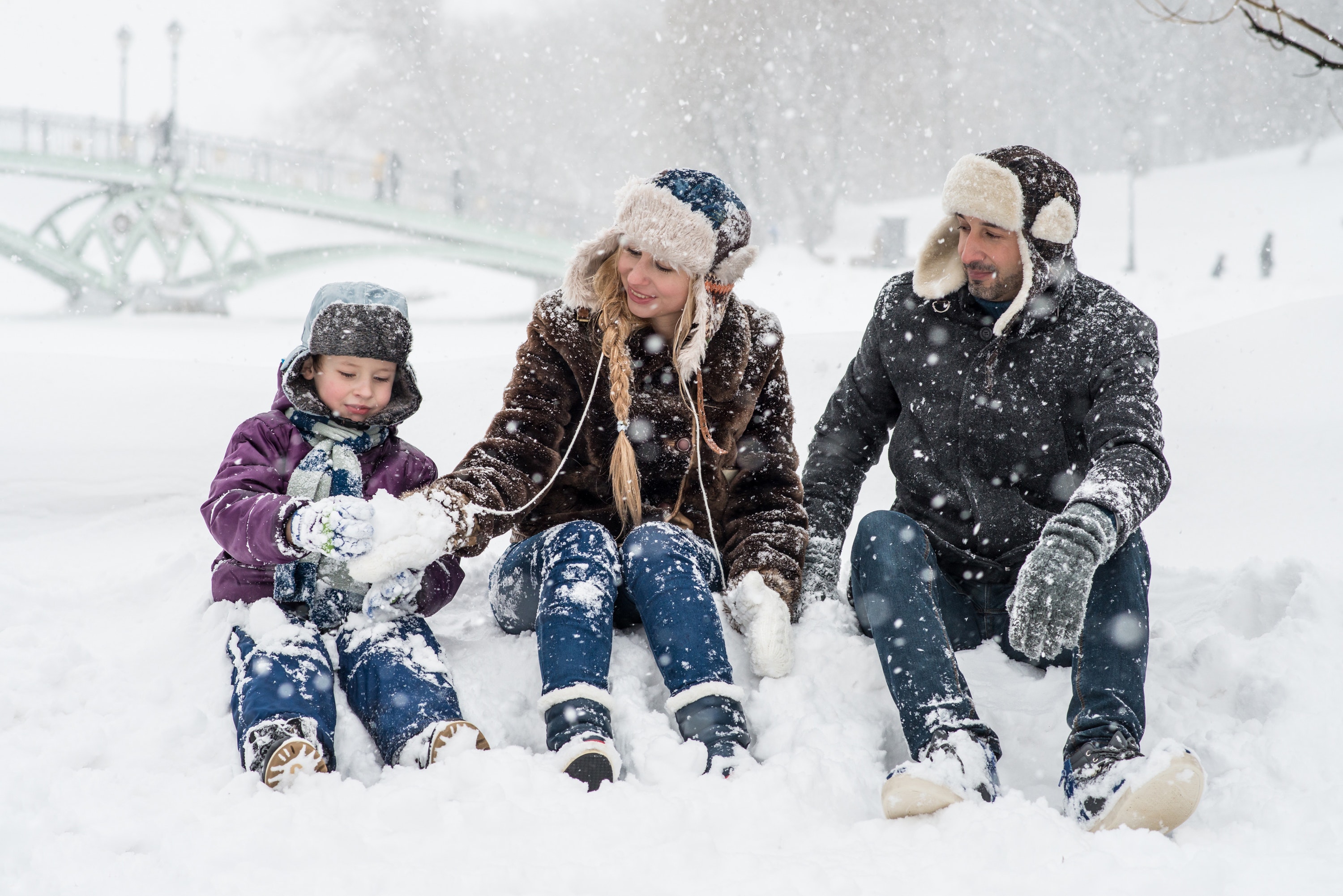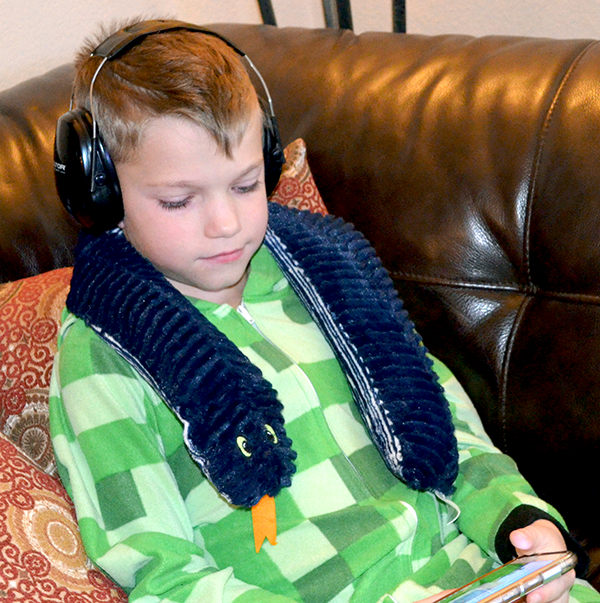Winter holidays can be a magical time of the year, but can also be overwhelming and stressful for some. This is especially true for children who have sensory differences. Here are 10 strategies to help your "sensory child" successfully navigate family get-togethers and other holiday events.
1. Prepare your child in advance
1. Prepare your child in advance
Reading social stories or children’s books about holiday parties and family gatherings can help children know what to expect. Consider making your own custom book that includes pictures of the relatives, friends, and places you will be visiting. Visual schedules can also be helpful. Talk to your child in advance about who's going to be there and what you'll be doing while your there. "When we first get to Grandma’s house we’re going to talk with everyone and you can play with ____ while we do that. Then we’re going to eat dinner in the dining room. You will be sitting at the kid’s table with your cousins on the chair that has your special wiggle seat," etc.

2. Know and honor your child's limits
You know your child and his/her limits better than anyone else. Do your best to prevent over-scheduling your child and family, especially during the holidays when routines are already "off" due to school breaks. Bright lights and sounds, new smells, unexpected touch, and different environments can be extremely challenging and overwhelming for kiddos who have sensory issues. Bring calming sensory tools along. Arriving later than others and leaving early if needed can be helpful strategies. Driving 2 cars to family celebrations or special events may be a good idea if your child sometimes gets so overloaded that they have a sensory meltdown (just in case you need to leave early when your child has reached their limit). Remember that New Year's Eve celebrations can be especially difficult and scary for sensory kids due to the fireworks that often go with that night.
3. Keep your schedule as normal as possible
Keep your child’s schedule as normal as possible on the day of a special event. Kiddos who have sensory challenges do best with routines they know; let them know what's going to be happening in advance. All children generally function better when they are well rested, so especially try to keep normal sleep schedules. If you have a long drive and have to wake your child much earlier than normal, consider letting him/her wear their pajamas and take along their pillow or favorite blanket for the ride. Let your child choose what they’d like to wear the night before - something that's comfortable to them regardless of how it looks. Skip new holiday clothes that your child's not used to wearing and may be uncomfortable for them. Tagless and compression-style clothing can be helpful choices for self-regulation.
4. Provide calming deep pressure or movement input before you head out
Play calming music in the car – or let your child listen to his/her favorite music. Pretzels and “sea sickness" (pressure point) bracelets can sometimes be helpful if your child gets car sick. Provide helpful doses of deep pressure or movement sensory input when you first arrive at your destination and throughout the day by using a wiggle seat, doing animal walks/jumping jacks/wall push-ups, having the child help lift and carry things – or having them help shovel snow.
5. Use weighted and deep pressure activities and tools throughout the day
Tuck in some sensory tools that provide calming / organizing sensory input. Weighted shoulder wraps / vests / lap pads / blankets, or deep pressure compression belts / vests can be helpful; the last 2 can be worn under children’s clothing if desired. Quiet fidget tools can help keep restless bodies, fingers, and anxious minds more relaxed! Oral input can be a powerful self-regulator; have your child wear chewy jewelry, drink with a straw, chew gum, and/or eat crunchy snacks to help self-regulate.

(Pictured: Snakey Shoulder - Lap Weights, Junior Earmuffs)
6. Provide short sensory breaks
Providing a 10-minute break every hour or so in a quiet space – or taking a short walk outside, can help "reset "a child's nervous system. These are easy ways to help prevent sensory overload that can lead to meltdowns. The best strategy is to keep your child in a “just right” state of regulation and being proactive to help prevent overstimulation or a meltdown. Know that once a child goes into a true sensory meltdown, they typically don’t have the ability or awareness to be able to stop it.
7. Help educate others in advance
7. Help educate others in advance
Be sure to make family and friends aware in advance that music, bright holiday lights, strong smells (like perfume, scented candles, and new foods), unexpected or light touch, and even hugs may be very difficult, painful, or overstimulating for your child. Sensory earmuffs can be very helpful in reducing noise. Consider sharing a good book with family members beforehand that can help them gain a better understanding of sensory issues. Sensational Kids, Raising a Sensory Smart Child and The Out of Sync Child are a few favorites. Sensory kids can “look just fine” to others when they aren’t fine.... Advocating for your child and teaching others the differences between “sensory” and “behavior” Issues is an ongoing necessity for us as parents of a sensory kid.
8. Wrap some familiar toys for gift exchanges
8. Wrap some familiar toys for gift exchanges
Some children get anxious about opening gifts because they are new and unfamiliar. Consider wrapping a few of your child’s favorite toys so they aren’t caught off guard when they open them.

9. Bring some of your child's favorite activities and foods along
When visiting friends or relatives, bring some toys along that your child loves or finds comforting. Sensory kids often become anxious when they are in a new environment they can’t control and things they are familiar with aren’t there. A simple way to help is to bring along familiar toys and foods they like (prepared in a familiar way) – as well as silverware and dishes they are used to using. Remember that different smells, textures, new foods, and even using different dishes or silverware – can be stressful and overwhelming for sensory kids. Incorporating some familiar touches in a new setting when you're away from home can really help.
10. Create a calming space
10. Create a calming space
Wherever you are, try to ensure there is a safe space that your child can retreat to if they are feeling overwhelmed and need a sensory break. Bring a few of their favorite calming tools along. When you first arrive, set up the space and show your child where it is and let them know they can go there if they need some down time or a calming break. Consider having a “secret” signal or word that can allow your child to silently communicate they need a break or perhaps even need to leave if they become really overstimulated. Know that regardless of how well you prepare, the unpredictability and overload that often goes with holidays may trigger sensory overload and a meltdown. The key is doing everything you can in your power to prevent a meltdown from ever happening.
Holidays can provide nice opportunities for families to connect and thrive together! One of our most important jobs as parents is helping families, friends, and others learn to recognize, accept, and celebrate children’s uniqueness. Every child is a gift and a blessing; children have so much to teach the rest of us.
More articles you might enjoy:
Therapy Shoppe OTs, December 4, 2019
©2019 Therapy Shoppe® Incorporated. All rights reserved.


 (Pictured:
(Pictured: